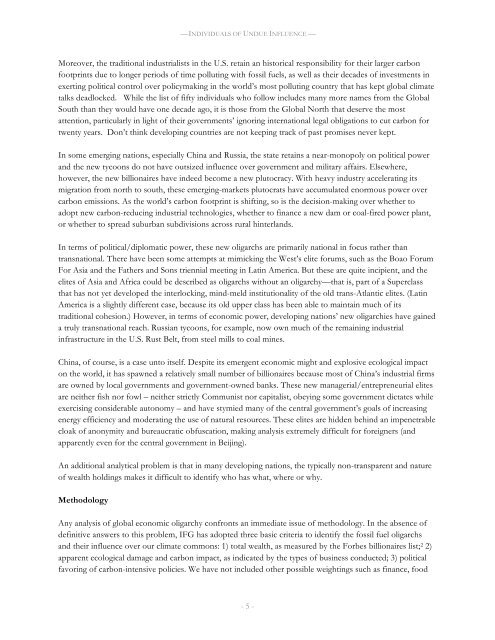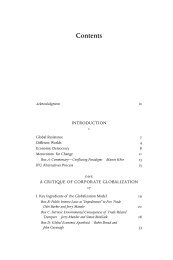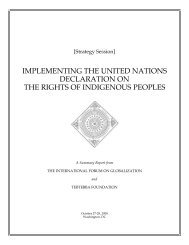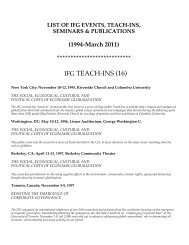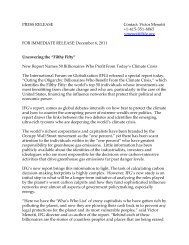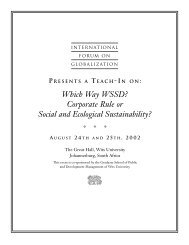Outing the Oligarchy - International Forum on Globalization
Outing the Oligarchy - International Forum on Globalization
Outing the Oligarchy - International Forum on Globalization
You also want an ePaper? Increase the reach of your titles
YUMPU automatically turns print PDFs into web optimized ePapers that Google loves.
—INDIVIDUALS OF UNDUE INFLUENCE —<br />
Moreover, <str<strong>on</strong>g>the</str<strong>on</strong>g> traditi<strong>on</strong>al industrialists in <str<strong>on</strong>g>the</str<strong>on</strong>g> U.S. retain an historical resp<strong>on</strong>sibility for <str<strong>on</strong>g>the</str<strong>on</strong>g>ir larger carb<strong>on</strong><br />
footprints due to l<strong>on</strong>ger periods of time polluting with fossil fuels, as well as <str<strong>on</strong>g>the</str<strong>on</strong>g>ir decades of investments in<br />
exerting political c<strong>on</strong>trol over policymaking in <str<strong>on</strong>g>the</str<strong>on</strong>g> world’s most polluting country that has kept global climate<br />
talks deadlocked. While <str<strong>on</strong>g>the</str<strong>on</strong>g> list of fifty individuals who follow includes many more names from <str<strong>on</strong>g>the</str<strong>on</strong>g> Global<br />
South than <str<strong>on</strong>g>the</str<strong>on</strong>g>y would have <strong>on</strong>e decade ago, it is those from <str<strong>on</strong>g>the</str<strong>on</strong>g> Global North that deserve <str<strong>on</strong>g>the</str<strong>on</strong>g> most<br />
attenti<strong>on</strong>, particularly in light of <str<strong>on</strong>g>the</str<strong>on</strong>g>ir governments’ ignoring internati<strong>on</strong>al legal obligati<strong>on</strong>s to cut carb<strong>on</strong> for<br />
twenty years. D<strong>on</strong>’t think developing countries are not keeping track of past promises never kept.<br />
In some emerging nati<strong>on</strong>s, especially China and Russia, <str<strong>on</strong>g>the</str<strong>on</strong>g> state retains a near-m<strong>on</strong>opoly <strong>on</strong> political power<br />
and <str<strong>on</strong>g>the</str<strong>on</strong>g> new tyco<strong>on</strong>s do not have outsized influence over government and military affairs. Elsewhere,<br />
however, <str<strong>on</strong>g>the</str<strong>on</strong>g> new billi<strong>on</strong>aires have indeed become a new plutocracy. With heavy industry accelerating its<br />
migrati<strong>on</strong> from north to south, <str<strong>on</strong>g>the</str<strong>on</strong>g>se emerging-markets plutocrats have accumulated enormous power over<br />
carb<strong>on</strong> emissi<strong>on</strong>s. As <str<strong>on</strong>g>the</str<strong>on</strong>g> world’s carb<strong>on</strong> footprint is shifting, so is <str<strong>on</strong>g>the</str<strong>on</strong>g> decisi<strong>on</strong>-making over whe<str<strong>on</strong>g>the</str<strong>on</strong>g>r to<br />
adopt new carb<strong>on</strong>-reducing industrial technologies, whe<str<strong>on</strong>g>the</str<strong>on</strong>g>r to finance a new dam or coal-fired power plant,<br />
or whe<str<strong>on</strong>g>the</str<strong>on</strong>g>r to spread suburban subdivisi<strong>on</strong>s across rural hinterlands.<br />
In terms of political/diplomatic power, <str<strong>on</strong>g>the</str<strong>on</strong>g>se new oligarchs are primarily nati<strong>on</strong>al in focus ra<str<strong>on</strong>g>the</str<strong>on</strong>g>r than<br />
transnati<strong>on</strong>al. There have been some attempts at mimicking <str<strong>on</strong>g>the</str<strong>on</strong>g> West’s elite forums, such as <str<strong>on</strong>g>the</str<strong>on</strong>g> Boao <str<strong>on</strong>g>Forum</str<strong>on</strong>g><br />
For Asia and <str<strong>on</strong>g>the</str<strong>on</strong>g> Fa<str<strong>on</strong>g>the</str<strong>on</strong>g>rs and S<strong>on</strong>s triennial meeting in Latin America. But <str<strong>on</strong>g>the</str<strong>on</strong>g>se are quite incipient, and <str<strong>on</strong>g>the</str<strong>on</strong>g><br />
elites of Asia and Africa could be described as oligarchs without an oligarchy—that is, part of a Superclass<br />
that has not yet developed <str<strong>on</strong>g>the</str<strong>on</strong>g> interlocking, mind-meld instituti<strong>on</strong>ality of <str<strong>on</strong>g>the</str<strong>on</strong>g> old trans-Atlantic elites. (Latin<br />
America is a slightly different case, because its old upper class has been able to maintain much of its<br />
traditi<strong>on</strong>al cohesi<strong>on</strong>.) However, in terms of ec<strong>on</strong>omic power, developing nati<strong>on</strong>s’ new oligarchies have gained<br />
a truly transnati<strong>on</strong>al reach. Russian tyco<strong>on</strong>s, for example, now own much of <str<strong>on</strong>g>the</str<strong>on</strong>g> remaining industrial<br />
infrastructure in <str<strong>on</strong>g>the</str<strong>on</strong>g> U.S. Rust Belt, from steel mills to coal mines.<br />
China, of course, is a case unto itself. Despite its emergent ec<strong>on</strong>omic might and explosive ecological impact<br />
<strong>on</strong> <str<strong>on</strong>g>the</str<strong>on</strong>g> world, it has spawned a relatively small number of billi<strong>on</strong>aires because most of China’s industrial firms<br />
are owned by local governments and government-owned banks. These new managerial/entrepreneurial elites<br />
are nei<str<strong>on</strong>g>the</str<strong>on</strong>g>r fish nor fowl – nei<str<strong>on</strong>g>the</str<strong>on</strong>g>r strictly Communist nor capitalist, obeying some government dictates while<br />
exercising c<strong>on</strong>siderable aut<strong>on</strong>omy – and have stymied many of <str<strong>on</strong>g>the</str<strong>on</strong>g> central government’s goals of increasing<br />
energy efficiency and moderating <str<strong>on</strong>g>the</str<strong>on</strong>g> use of natural resources. These elites are hidden behind an impenetrable<br />
cloak of an<strong>on</strong>ymity and bureaucratic obfuscati<strong>on</strong>, making analysis extremely difficult for foreigners (and<br />
apparently even for <str<strong>on</strong>g>the</str<strong>on</strong>g> central government in Beijing).<br />
An additi<strong>on</strong>al analytical problem is that in many developing nati<strong>on</strong>s, <str<strong>on</strong>g>the</str<strong>on</strong>g> typically n<strong>on</strong>-transparent and nature<br />
of wealth holdings makes it difficult to identify who has what, where or why.<br />
Methodology<br />
Any analysis of global ec<strong>on</strong>omic oligarchy c<strong>on</strong>fr<strong>on</strong>ts an immediate issue of methodology. In <str<strong>on</strong>g>the</str<strong>on</strong>g> absence of<br />
definitive answers to this problem, IFG has adopted three basic criteria to identify <str<strong>on</strong>g>the</str<strong>on</strong>g> fossil fuel oligarchs<br />
and <str<strong>on</strong>g>the</str<strong>on</strong>g>ir influence over our climate comm<strong>on</strong>s: 1) total wealth, as measured by <str<strong>on</strong>g>the</str<strong>on</strong>g> Forbes billi<strong>on</strong>aires list; 2 2)<br />
apparent ecological damage and carb<strong>on</strong> impact, as indicated by <str<strong>on</strong>g>the</str<strong>on</strong>g> types of business c<strong>on</strong>ducted; 3) political<br />
favoring of carb<strong>on</strong>-intensive policies. We have not included o<str<strong>on</strong>g>the</str<strong>on</strong>g>r possible weightings such as finance, food<br />
- 5 -


